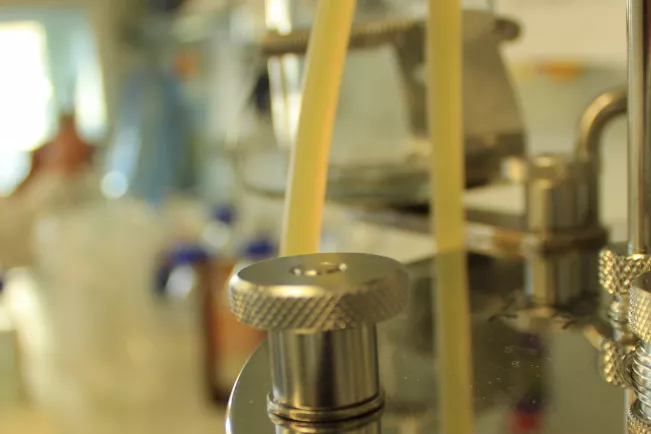Department of Natural Sciences
Biotechnology

Lecture
Elective Course
- in BSc Applied Biology, 4th Semester
- 6 h/week (2L/2E/2P)
- Credits: 6 ECTS
Content:
- Bioprocess Engineering: fermenter design, size and materials of bioreactors, aeration, temperature control, sterilization
- Culturing conditions and purification strategies: primary and secondary metabolites, growth yield, productivity, time-volume-yield, batch and fed-batch cultivation, chemostat, turbidostat, concentration of cells by centrifugation and filtration, cell disruption
- Food Biotechnology: beer brewing, making of wine, fermented dairy products, acetic acid, citric acid and amino acid production, conversion of starch to high fructose syrup, strategies for overproducing metabolites by microorganisms
- Production of Biopolymers: bioplastic made of polylactide, polyhydroxyalkanoates or polysaccharides, emulsifying agents made of alginate, dextran or xanthan
- Enzymes in washing powder for the making of food or textiles; diagnostic enzymes, enzymes for the production of fine chemicals
- Pharmaceutical Biotechnology: hormones and growth factors, enzymes and enzyme modulators, vaccines, monoclonal antibodies
- Diagnostic Biotechnology: Protein-based diagnostics: ELISA; DNA-based diagnostics: DNA-Hybridization; Amplification of target sequence by PCR; Microarray analysis
- Plant Biotechnology: genetically modified food, cloning by meristem propagation, introducing desired traits
- Environmental Biotechnology: degradation of xenobiotics, wastewater treatment plants, bioremediation; biogas production
Exercises
Content:
- Repetition of the content of the lectures
- Stimulation of critical thinking
- Gaining background information about Biotechnology topics by internet search
- Connecting information from different resources
Internship
Content:
- Protein purification by affinity chromatography and protein detection SDS-PAGE and Western Blot
- Microbial production of dihydroxyacetone
- Detection of ovalbumin as potential allergen in composite food by ELISA
- Production of wine
- Enzyme immobilization and use of a fixed-bed reactor for an extended period of time
Requirements
Successful participation in Written Exam and in Practical Course.
Written Exam: 60%
Practical Course: 40%
Literature
- Ratledge & Kristiansen: Basic Biotechnology; Cambridge University Press; ISBN:0521779170
- Clark & Pazdernik: Biotechnology; Academic Press; ISBN: 0123850150
- Kück & Frankenberg-Dinkel: Biotechnology; De Gruyter; ISBN: 3110341107
- Herren: Introduction to Biotechnology – An Agricultural Revolution; Delmar Learning; ISBN: 076684272
- Scragg: Environmental Biotechnology; Oxford University Press; ISBN: 0199268673
Links
Further links